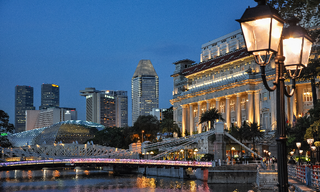Raphaël Surber: «They Are All Doing Their Own Corona Thing»
Blacklists, systems of green and red lights, abruptly changing quarantine rules with awkward exceptions. Who can still keep track of the corona-measures? We can’t continue like this, says Raphaël Surber in his essay for finews.first.
This article is published on finews.first, a forum for authors specialized in economic and financial topics.
After months of countries pursuing their own individual corona-measures, it is high time to finally get together and develop plans for how the international passenger traffic can be brought back to life with or rather despite corona. After all, to be honest, we can’t continue like this.
At the moment, it seems as if all countries are pursuing one of the following three, bizarre, scenarios:
- Becoming corona-free. Much like New Zealand, which for a long time presented a proud image of itself, until new cases emerged last week. The fact that «corona-free» doesn’t exist in times of a raging, global pandemic (and isn’t necessarily desirable either) is being deliberately ignored.
- Herd immunity. All those who believe that a regulated, global passenger traffic can exist only once herd immunity has been achieved, ought to think again.
- Vaccine – a dream come true. Maybe there will be a vaccine against Sars-CoV-2 earlier or later. Or maybe not. Or perhaps it won’t be as effective as expected, or the virus will change. Or a new devastating virus takes hold and prompts yet another pandemic.
This is all pretty limited in scope or even not at all far-sighted. Because before one of the three scenarios becomes reality, the economy, which is also being powered by the tourism industry, will stall. Hundreds of millions of people, who depend directly or indirectly on the movement of people across the globe, on the holidays they make, on business trips or travel for other reasons, will lose their livelihoods.
This is tragic for every single one of them – be it the travel agency clerk in St. Gallen or the security man in the diving resort in the Philippines – just to mention two extremes of this world.
«We should learn to take corona into consideration as a risk factor»
But while the travel agent will be able to apply for unemployment benefits, check his options at the job seekers' office and potentially pursue another career, the guard from the Philippines will slip into poverty together with his whole family.
Therefore, it is high time for the global community to pull together and seek for solutions and ways to enable global passenger traffic. With corona or despite corona.
Much as we include dengue fever or malaria, or latent armed struggles in a touristic region or other types of risks on our travels into consideration, we should also learn to take corona into consideration as a risk factor.
«Resuming global tourism will prevent millions and millions of people from slipping into poverty»
It must be possible to have a reasonably well functioning tourism business and open borders for all even in times of corona, with universally applicable, singular measures across the globe. Much like the World Travel & Tourism Council (WTTC) and CEOs of major tourism firms across the world have demanded in an open letter the other day.
It isn’t elitist to demand the ability to travel. It has to do with the fact the resuming global tourism will prevent millions and millions of people from slipping into poverty.
Raphaël Surber is co-founder of the leading Swiss travel-news-portal travelnews.ch, owner of a travel agency and director of association basmati, a Swiss charity platform for projects in Southeast Asia.
Previous contributions: Rudi Bogni, Peter Kurer, Rolf Banz, Dieter Ruloff, Werner Vogt, Walter Wittmann, Alfred Mettler, Peter Hody, Robert Holzach, Craig Murray, David Zollinger, Arthur Bolliger, Beat Kappeler, Chris Rowe, Stefan Gerlach, Marc Lussy, Nuno Fernandes, Richard Egger, Maurice Pedergnana, Marco Bargel, Steve Hanke, Urs Schoettli, Ursula Finsterwald, Stefan Kreuzkamp, Oliver Bussmann, Michael Benz, Peter Hody, Albert Steck, Martin Dahinden, Thomas Fedier, Alfred Mettler, Brigitte Strebel, Peter Hody, Mirjam Staub-Bisang, Nicolas Roth, Thorsten Polleit, Kim Iskyan, Stephen Dover, Denise Kenyon-Rouvinez, Christian Dreyer, Kinan Khadam-Al-Jame, Robert Hemmi, Anton Affentranger, Yves Mirabaud, Katharina Bart, Frédéric Papp, Hans-Martin Kraus, Gerard Guerdat, Mario Bassi, Stephen Thariyan, Dan Steinbock, Rino Borini, Bert Flossbach, Michael Hasenstab, Guido Schilling, Werner E. Rutsch, Dorte Bech Vizard, Adriano B. Lucatelli, Katharina Bart, Maya Bhandari, Jean Tirole, Hans Jakob Roth, Marco Martinelli, Thomas Sutter, Tom King, Werner Peyer, Thomas Kupfer, Peter Kurer, Arturo Bris, Frederic Papp, James Syme, Dennis Larsen, Bernd Kramer, Ralph Ebert, Armin Jans, Nicolas Roth, Hans Ulrich Jost, Patrick Hunger, Fabrizio Quirighetti, Claire Shaw, Peter Fanconi, Alex Wolf, Dan Steinbock, Patrick Scheurle, Sandro Occhilupo, Will Ballard, Michael Bornhaeusser, Nicholas Yeo, Claude-Alain Margelisch, Jean-François Hirschel, Jens Pongratz, Samuel Gerber, Philipp Weckherlin, Anne Richards, Antoni Trenchev, Benoit Barbereau, Pascal R. Bersier, Shaul Lifshitz, Klaus Breiner, Ana Botín, Martin Gilbert, Jesper Koll, Ingo Rauser, Carlo Capaul, Claude Baumann, Markus Winkler, Konrad Hummler, Thomas Steinemann, Christina Boeck, Guillaume Compeyron, Miro Zivkovic, Alexander F. Wagner, Eric Heymann, Christoph Sax, Felix Brem, Jochen Moebert, Jacques-Aurélien Marcireau, Peter Hody, Ursula Finsterwald, Claudia Kraaz, Michel Longhini, Stefan Blum, Zsolt Kohalmi, Karin M. Klossek, Nicolas Ramelet, Søren Bjønness, Lamara von Albertini, Andreas Britt, Gilles Prince, Darren Willams, Salman Ahmed, Stephane Monier, and Peter van der Welle, Beat Wittmann, Ken Orchard, Christian Gast, Didier Saint-Georges, Jeffrey Bohn, Juergen Braunstein, Jeff Voegeli, Gérard Piasko, Fiona Frick, Stefan Schneider, Matthias Hunn, Andreas Vetsch, Fabiana Fedeli, Marionna Wegenstein, Kim Fournais, Carole Millet, Ralph Ebert, Lars Jaeger, Swetha Ramachandran, Brigitte Kaps, Thomas Stucki, Teodoro Cocca, Neil Shearing, Claude Baumann, Guy de Blonay, Tom Naratil, Oliver Berger, Robert Sharps, Santosh Brivio, Tobias Mueller, Florian Wicki, Jean Keller, Fabrizio Pagani, Niels Lan Doky, Michael Welti, Karin M. Klossek, Ralph Ebert, Johnny El Hachem, Judith Basad, Katharina Bart, Thorsten Polleit, Beat Wittmann, Bernardo Brunschwiler, Peter Schmid, Karam Hinduja, Stuart Dunbar, Zsolt Kohalmi, Lars Jaeger, and Peter Hody.






















